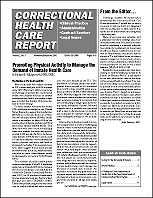Legal Developments
Author: Margaret R. Moreland, J.D., M.S.L.S..
Source: Volume 04, Number 01, November/December 2002 , pp.9-11(3)

< previous article |next article > |return to table of contents
Abstract:
In a decision that came as a surprise to many, despite the logic of its evolution, the U.S. Supreme Court has carved out some protection for criminal offenders who are mentally retarded. The case before it was an appeal by Daryl Renard Atkins, a mentally retarded person who had been convicted of abduction, armed robbery, and capital murder. The other participant in the crime was able to avoid the death penalty by agreeing to plead guilty to first-degree murder and testifying against Atkins. Ralph L. Watkins, Jr. was arrested in connection with a search of his apartment for drugs, pursuant to a search warrant. Arresting officers found a torn plastic bag, some loose crack cocaine, and some other evidence that aroused a suspicion that Watkins had just swallowed some drugs. However, in spite of assurances that he would not face any additional charges if that was the case, and warnings about the possibility of dying from swallowing drugs, he denied swallowing anything. He also declined medical treatment.Keywords: medical screening, intake, Gibson v. County of Washoe, CPR, Estelle v. Gamble
Affiliations:
1: Pace University School of Law Library.